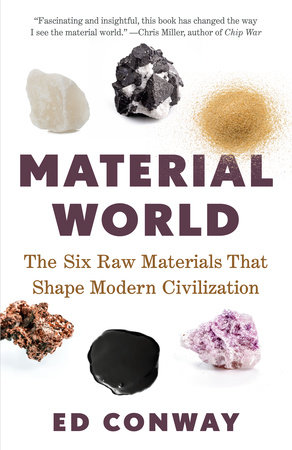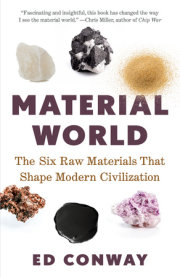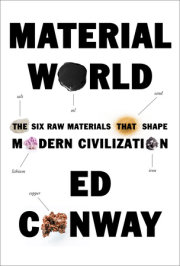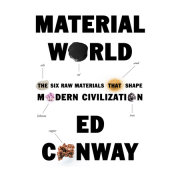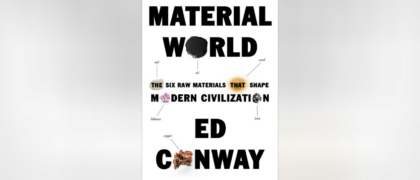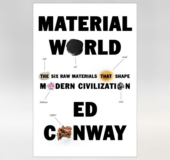*Named one of the "Best Books of 2023" by The Economist*
“Rich in revelations . . . [Conway’s] analogies bring the scientific processes to life . . . Offers a fascinating lens on the intricacies of the modern supply chain, the underappreciated science behind everyday objects, and the ways that subtle—and not so subtle—changes in governmental policies shift the role of these materials in the global economy.” —Bronwen Everill, Foreign Policy
"Compelling . . . Material World [makes] strong points . . . These days, Conway reckons, humanity mines, drains, and blasts more stuff out of the ground each year than it did in total during the roughly three hundred millennia between the birth of the species and the start of the Korean War. This comes with immense consequences, both ecological and social, even if we don’t attend to them." —Elizabeth Kolbert, The New Yorker
"A spirited tour of six material things on which our lives depend. . . [Conway] ably describes how commodities interact . . . Lively and impeccably written—a welcome addition to the way-the-world-works literature." —Kirkus Reviews (starred review)
"[A] masterful exploration of the materials that underpin civilization . . . Like Bill Bryson, Conway delights in facts . . . What distinguishes Material World is his access. Although he is very well informed, this is not a remote, academic analysis: he has been to the salt mines beneath the North Sea, the mineral railway of the Atacama Desert, the Chilean town being swallowed by the world's demand for copper, and as a TV journalist he conveys a vivid sense of these places." —Will Dunn, The New Statesman
"Full of colorful characters and fascinating connections, Material World shows how the seemingly simplest materials—from sand to salt to iron—require unbelievably complex refining and processing before arriving at their final form. With absorbing storytelling, Conway shows why we should not take the material world for granted. Fascinating and insightful, this book has changed the way I see the material world." —Chris Miller, author of Chip War
"Deconstructs the modern world for us to see inside . . . As we fret and argue about how to tackle climate change, economic development and geopolitical tensions, this book is a timely reminder of our reliance on physical stuff, and it offers a challenging, practical perspective on these debates." —Paul J. Davies, Bloomberg
"Fascinating . . . Lucidly shows the scale of the environmental problem and the irony of new demand created by efforts to wean ourselves off oil on to batteries." —John Gapper, Financial Times
"Goes straight on the 'must-read' list . . . Conway is one of the most adroit commentators on economics and business of our time." ―City AM
"Lively, rich and exciting . . . Full of surprises." —Peter Frankopan, author of The Earth Transformed
"Fascinating and forensic in equal measure . . . Reveals the web of mining and manufacturing that underpins the lives of everyone on the planet." —Mark Miodownik, author of Stuff Matters
"A highly-engaging and important look at the key materials powering our modern world, and how we feed our insatiable appetite for them." —Kenneth Rogoff, Professor of Economics at Harvard University and ex-Chief Economist of the IMF
"A compelling narrative of the human story." —Tim Marshall, author of Prisoners of Geography
"Expansive, erudite, and edifying. A stunning insight into the materials that shaped our history and built the modern world." —Lewis Dartnell, author of Origins
"Fascinating, fun, and vitally important. A wonderful exploration of the world we've built yet somehow manage to ignore." —Tim Harford, author of The Data Detective
"Conway's gripping explanation of a world you didn't know needed explaining deserves this highest of accolades: Material World, once read, leaves us baffled that nobody ever thought of writing it before." —Matthew Parris, author of Fracture
"A stunning book that will transform the way you think about economics and life. Brilliantly written." —Matthew Syed, author of Rebel Ideas
"Ed Conway is a great thinker... Material World is an engrossing study of the basic substances on which we all depend. Anyone who cares about the resources which built our world and where mankind is heading must read this vital book." —Adam Boulton, Times Radio
"A masterful exploration of how materials shape our world more than ever – economically, geopolitically and environmentally." —Diane Coyle, Bennett Professor of Public Policy at the University of Cambridge

